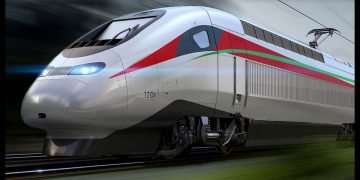By Maria Kalamatas
Rabat, MOROCCO —
Morocco has officially launched construction of the long-anticipated high-speed rail (HSR) extension from Kenitra to Marrakech, a strategic infrastructure project aimed at transforming national mobility ahead of the 2030 FIFA World Cup, which Morocco is set to co-host with Spain and Portugal.
The 450-kilometer expansion of the existing Al Boraq line—Africa’s first HSR corridor—will link the economic and touristic hubs of Casablanca and Marrakech in under 1 hour and 40 minutes. Currently, the journey takes approximately 3 hours by conventional rail.
“This is more than a transport project. It’s a national signal of ambition,” said ONCF (Moroccan National Railways) Director General Mohamed Rabie Khlie at the launch ceremony in Casablanca. “We are laying the tracks for an integrated logistics corridor that connects ports, airports, factories, and people.”
Economic zones to benefit from enhanced rail cargo
While the public spotlight has been on passenger speed, freight logistics stakeholders are equally focused on the project’s cargo potential. The extension will connect to the Casablanca Logistics Park and streamline cargo flows to the rapidly growing port of Safi, a gateway for phosphate exports and industrial goods.
“Rail cargo in Morocco has long needed modernization,” said Fatiha El Idrissi, Director of Logistics at Maroc Industrie. “This corridor could reduce trucking costs by 30% and help decarbonize domestic freight.”
French and Chinese partners lead construction efforts
The project is being delivered by a joint venture between France’s Alstom and China Railway Construction Corporation (CRCC), with Moroccan engineers overseeing local integration. Funding comes from a blended pool of national investment, French development loans, and Gulf sovereign support.
2030 World Cup as a deadline and opportunity
Officials are working under tight timelines to ensure full operability by mid-2029. “This is not just about moving people for a football match,” said transport minister Mohamed Abdeljalil. “It’s about leveraging the World Cup to catalyze long-term economic infrastructure.”
The Marrakech HSR extension, once completed, is expected to carry more than 10 million passengers per year and create over 8,000 direct and indirect jobs during construction and operation phases.























